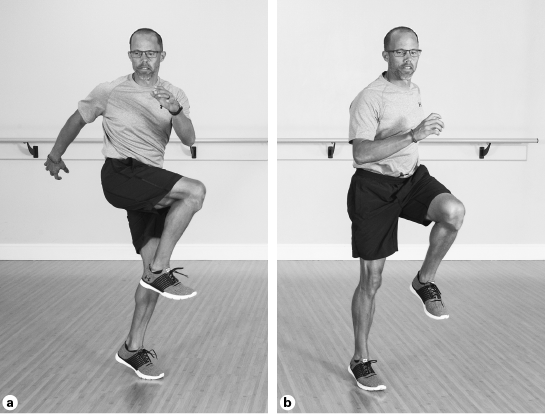Lateral skip with rotation exercise
This is an excerpt from Pilates and Conditioning for Athletes by Amy Lademann,Rick Lademann.
Use the same marching rhythm of the lateral skip and add a crossover.
TECHNIQUE
- As you perform the lateral skip, cross the back leg in front of the front leg by rotating the back hip up and forward (a and b).
- Rotate only the back leg forward. Do not rotate the forward leg backward. When going to the right, only cross over your left leg and come back to center each time and vice versa.

Coaching Tip
We can't express enough how important it is for an athlete to understand movement, and this education starts with skipping. Skipping teaches an athlete not only how to warm up correctly, but also how to move correctly.
The rhythm skips are elasticity exercises that teach an athlete how to become more reactive to the ground. This is important in developing speed, which is essential in all sports. The key factor in reaching full velocity is very little ground-contact time. In other words, the athlete's feet must be reactive and quickly push off the ground. This dynamic skipping series focuses on the athlete's reactivity to the ground. Skipping develops the first aspect of the agility pillar: establishing simple patterns for efficiently responding to the ground.
SHOP

Get the latest insights with regular newsletters, plus periodic product information and special insider offers.
JOIN NOW
Latest Posts
- How do I integrate nutrition education into PE?
- How does the support of friends and family influence physical activity?
- What makes the Physical Best approach unique?
- Strength training gimmicks . . . or not?
- How do vitamins and minerals support our bodies?
- Why do many people have difficulty losing weight?


